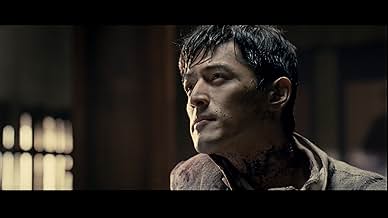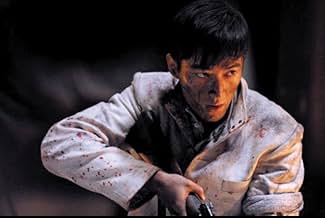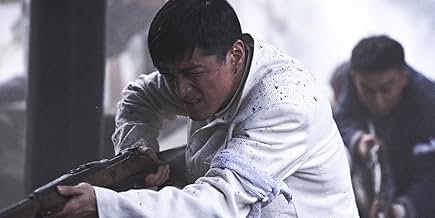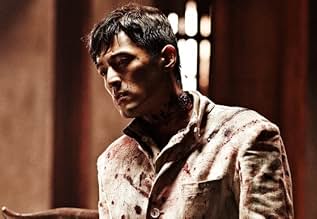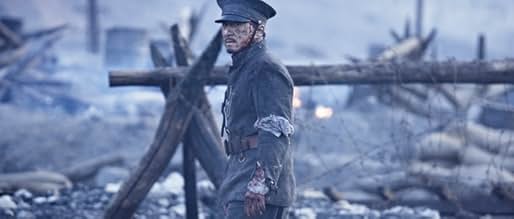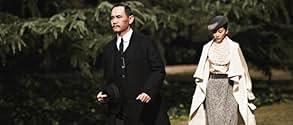VALUTAZIONE IMDb
5,7/10
6726
LA TUA VALUTAZIONE
Aggiungi una trama nella tua linguaA historical drama based on the founding of the Republic of China when nationalist forces led by Sun Yat-sen overthrew the Qing Dynasty.A historical drama based on the founding of the Republic of China when nationalist forces led by Sun Yat-sen overthrew the Qing Dynasty.A historical drama based on the founding of the Republic of China when nationalist forces led by Sun Yat-sen overthrew the Qing Dynasty.
- Premi
- 6 vittorie e 7 candidature totali
Bingbing Li
- Xu Zonghan
- (as Bingbing Lee)
Jaycee Cho-Ming Chan
- Zhang Zhenwu
- (as Jaycee Chan)
Yu-Hang To
- Xiong Bingkun
- (as Dennis To)
Duobujie
- Feng Guozhang
- (as Duobuji)
Recensioni in evidenza
Being billed as Jackie Chan's centennial film - well it depends on who's counting since IMDb.com listed it as the number 109, but seriously, who's counting? - it was a shrewd career choice to have made it an epic in both scale and story, an extremely well made piece of historical drama filled with political intrigue and a fine cast fleshing out their period roles, and to coincide it with the centennial year of the historical milestone it is based on as well, being the 1911 Xinhai Revolution that ultimately overthrew the Chinese Qing dynasty and ended more than 2000 years of Imperial rule in China. It could have been Rush Hour 4 or Police Story 6, but Jackie Chan had got grander ideas, so good for him.
With the aforementioned centennial celebrations of sorts, there are countless of films being released based on historical characters and incidents in the run up, with big budgeted, and undoubtedly easily labelled as propaganda films like The Founding of a Republic and its sequel The Founding of a Party boasting big name stars in its line up to draw record audiences. The latest yet to hit the big screen here, but soon enough unless the incessant playing of the trailers start to put people off, would be the story of Qiu Jin who was an anti- Qing revolutionary, in a film titled The Woman Knight of Mirror Lake directed by Herman Yau, and it is Qiu Jin who interesting enough, actually opens this film, which may make those unfamiliar with her character scratch their heads for a little while.
In a gist 1911 chronicles the fight by the Tong Meng Hui led by Sun Yat-Sen (Winston Chao) and his band of brothers to start a revolution against the corrupt Qing government who have so far been making plenty of concessions to foreign powers since the Opium War, with the country decaying morally and economically, the poor leading really miserable lives. If you're been watching Chinese cinema set around the era, you'd be fairly familiar with the strife and struggles of the Chinese people in and around that period, and this film centers itself around the failed attempts, and successful forays in leading an armed and bloody revolution to eject the corrupt leaders from their throne of power in Beijing.
Sharing director duties with Zhang Li, Jackie Chan despite being his 100th film which you may think the limelight should fall on him, somehow successfully dissolves into his General Huang Xing role, and didn't mind playing second fiddle to both Winston Chao's Sun Yat-sen and the life-changing events that unfolded in 1911. In many scenes you'll forget about Chan being Chan in his charismatic presence, even toning down his usual repertoire of stunts and moves that he's so well known for in his films, to ground himself very much in reality given it's an historical epic, providing only a glimpse of his old self in just a single scene no doubt to trademark this as a Jackie Chan flick. It's an admirable effort of restraint here, and once again allows Chan to showcase his serious side and acting chops since his successful Little Big Soldier.
The narrative also unfolded fairly evenly, with the first third of it unfolding in an interesting use of time and space rather than what you would think would be the usual chronological unravelling of events. I guess it goes to show the coming of age and maturing of contemporary Chinese mainstream cinema in adopting more creative techniques to their art and craft, and this dedication to accuracy and details show. With classy visual effects and beautiful art direction, the entire film became like a walk through time and history, with stuff you read about in the history books being brought alive. The film tried to cover as much ground as possible, and realistically read like a fast-forwarded synopsis of given key milestones being played out on screen, and the rest breezed through in the use of many inter-titles to fill in the gaps between scenes, which you may need a magnifying glass to read.
And where would the fun be if not for its ensemble cast, some inevitably only get limited air time, such as Ye Shao Qun, Jaycee Chan and Dennis To in very blink and you miss moments. Sun Chun playing Yuan Shikai almost steals the show with his portrayal as the power-hungry general who is biding his time with his allegiance, holding the Qing court ransom with his demands, and stalling his actions for the rebels, providing that level of political intrigue as a shaky alliance based on promises and the integrity of men come into play. Joan Chen also excelled in her role as the Empress Dowager (to think that many years back she was the Queen in Bernardo Bertolucci's The Last Emperor) and was a delight to watch how ineffective the entire dynasty rule had become behind the closed doors of the Forbidden City, while the other female actress in Li Bingbing as the wife of Huang Xing came off as far too lightweight in her nursing role. Winson Chao continues in his typecast role as Sun Yat-sen, portraying him in umpteenth film projects, though at no point you'll doubt his charismatic air and gravitas brought into the role.
1911 challenges Chinese filmmakers to dig deep into their history to tell stories based on its own contemporary, formative years. Even Singapore is finally getting into the act with its own 1965 film project, and I suppose any film industry worth its grain in salt would have these films lined up under its filmography that allows for a critical and artistic look at troubled times before, the ideals held then, and the struggles many took to bring us to where we are today. It may not be Jackie Chan's flashiest role or film, but definitely one of his classiest and dignified one yet. Highly recommended!
With the aforementioned centennial celebrations of sorts, there are countless of films being released based on historical characters and incidents in the run up, with big budgeted, and undoubtedly easily labelled as propaganda films like The Founding of a Republic and its sequel The Founding of a Party boasting big name stars in its line up to draw record audiences. The latest yet to hit the big screen here, but soon enough unless the incessant playing of the trailers start to put people off, would be the story of Qiu Jin who was an anti- Qing revolutionary, in a film titled The Woman Knight of Mirror Lake directed by Herman Yau, and it is Qiu Jin who interesting enough, actually opens this film, which may make those unfamiliar with her character scratch their heads for a little while.
In a gist 1911 chronicles the fight by the Tong Meng Hui led by Sun Yat-Sen (Winston Chao) and his band of brothers to start a revolution against the corrupt Qing government who have so far been making plenty of concessions to foreign powers since the Opium War, with the country decaying morally and economically, the poor leading really miserable lives. If you're been watching Chinese cinema set around the era, you'd be fairly familiar with the strife and struggles of the Chinese people in and around that period, and this film centers itself around the failed attempts, and successful forays in leading an armed and bloody revolution to eject the corrupt leaders from their throne of power in Beijing.
Sharing director duties with Zhang Li, Jackie Chan despite being his 100th film which you may think the limelight should fall on him, somehow successfully dissolves into his General Huang Xing role, and didn't mind playing second fiddle to both Winston Chao's Sun Yat-sen and the life-changing events that unfolded in 1911. In many scenes you'll forget about Chan being Chan in his charismatic presence, even toning down his usual repertoire of stunts and moves that he's so well known for in his films, to ground himself very much in reality given it's an historical epic, providing only a glimpse of his old self in just a single scene no doubt to trademark this as a Jackie Chan flick. It's an admirable effort of restraint here, and once again allows Chan to showcase his serious side and acting chops since his successful Little Big Soldier.
The narrative also unfolded fairly evenly, with the first third of it unfolding in an interesting use of time and space rather than what you would think would be the usual chronological unravelling of events. I guess it goes to show the coming of age and maturing of contemporary Chinese mainstream cinema in adopting more creative techniques to their art and craft, and this dedication to accuracy and details show. With classy visual effects and beautiful art direction, the entire film became like a walk through time and history, with stuff you read about in the history books being brought alive. The film tried to cover as much ground as possible, and realistically read like a fast-forwarded synopsis of given key milestones being played out on screen, and the rest breezed through in the use of many inter-titles to fill in the gaps between scenes, which you may need a magnifying glass to read.
And where would the fun be if not for its ensemble cast, some inevitably only get limited air time, such as Ye Shao Qun, Jaycee Chan and Dennis To in very blink and you miss moments. Sun Chun playing Yuan Shikai almost steals the show with his portrayal as the power-hungry general who is biding his time with his allegiance, holding the Qing court ransom with his demands, and stalling his actions for the rebels, providing that level of political intrigue as a shaky alliance based on promises and the integrity of men come into play. Joan Chen also excelled in her role as the Empress Dowager (to think that many years back she was the Queen in Bernardo Bertolucci's The Last Emperor) and was a delight to watch how ineffective the entire dynasty rule had become behind the closed doors of the Forbidden City, while the other female actress in Li Bingbing as the wife of Huang Xing came off as far too lightweight in her nursing role. Winson Chao continues in his typecast role as Sun Yat-sen, portraying him in umpteenth film projects, though at no point you'll doubt his charismatic air and gravitas brought into the role.
1911 challenges Chinese filmmakers to dig deep into their history to tell stories based on its own contemporary, formative years. Even Singapore is finally getting into the act with its own 1965 film project, and I suppose any film industry worth its grain in salt would have these films lined up under its filmography that allows for a critical and artistic look at troubled times before, the ideals held then, and the struggles many took to bring us to where we are today. It may not be Jackie Chan's flashiest role or film, but definitely one of his classiest and dignified one yet. Highly recommended!
1911, also known as 1911 Revolution, is a China production which marks two special occasions: 1. To commemorate the 100th anniversary of Xinhai Revolution, which Dr Sun Yat Sen over throws the corrupted Qing Monarchy, marking the two thousand years of monarchy control of China to an end. 2. This is actor and director Jackie Chan's 100th movie. What audience can see from 1911 is not only about how China has come to its way today from the past, but also witness how Jackie Chan is taking a new approach in the types of movie he is making.
Generally 1911 revolves around the few main characters: Chan as Huang Xing, the commander who lead his army to overthrow the Qing Monarchy, Winston Chao as Dr Sun, Li Bing Bing as Xu Zonghan, a revolutionist, who is also a good friend of Sun and Huang's lover, lastly with Joan Chen as Aisin Gioro Lungyu, the Empress who son is Puyi, the last emperor of China. The storyline of 1911 takes place around the last year of Qing Monarchy before the outbreak of Xinhai Revolution, where the story can be split into 2 parts: Huang leading the army to fight against the Qing army, and Sun gathering the support of the Chinese overseas through donations to fund the revolution, and stopping European banks from providing loans to Qing Monarchy. In the later part of the film, however, it falls on how Sun Yat Sen appoints Yuan Shikai, the Prime Minister of Qing Monarchy, as the first President of China Republic.
For those who are expecting Jackie Chan to create something new with his stunts and comical acts, they will be disappointed. 1911 marks Chan taking a serious role in his movie career by telling the remarkable chapter of the China history, which can be seen as another breakthrough after his role as a Chinese illegal immigrant paving a better life at Japan in Shinjuku Incident. (2009) As the director, he did not create any stunts or scenes of war for the sake of pleasing the audience who are seeing more action from him. War scenes are created to tell the pain people go through in a revolution, just as what was mentioned in the film, 'Revolution is not about death, but rather, paving a better future for the future generation.' The movie packs in plenty of details about the stages of the revolution, which provides a good reference for audience who do not have much knowledge about the revolution, and the aftermath of the founding of the Republic. However, those who are seeking action in the film will find 1911 a bore than something that entertains them.
While it seems that Chan is the leading character of 1911, the fact is Chao's role of Sun Yat Sen takes a heavier role compared to other leading role. This is the third time Chao reprise the role of Sun, which he did not disappoints audience who have watched his role as Sun in previous films such as The Soong Sisters (1997). While Chen's role of Lungyu could have been elaborated further, nevertheless it is a good try to see Chen taking one of the leading role, since it is not often she appears in a movie. We can see how Chen brings out the agony of Lungyu, after hearing from the officials in the imperial court on how King Louis XVI was executed by the French's during the French Revolution, hoping that both her son Puyi and herself will be spared from execution. It is also delighting to see Jackie's son, Jaycee, making a cameo appearance as a captain, together with Dennis To (Ip Man 2, The Legend is Born – Ip Man) as a soldier fighting in the revolution.
In short, do not expect too much action and comical appearances from Jackie Chan in 1911. More rather, be entertained with a new role Chan wants to create, which is something that is worth looking forward to in his career.
Generally 1911 revolves around the few main characters: Chan as Huang Xing, the commander who lead his army to overthrow the Qing Monarchy, Winston Chao as Dr Sun, Li Bing Bing as Xu Zonghan, a revolutionist, who is also a good friend of Sun and Huang's lover, lastly with Joan Chen as Aisin Gioro Lungyu, the Empress who son is Puyi, the last emperor of China. The storyline of 1911 takes place around the last year of Qing Monarchy before the outbreak of Xinhai Revolution, where the story can be split into 2 parts: Huang leading the army to fight against the Qing army, and Sun gathering the support of the Chinese overseas through donations to fund the revolution, and stopping European banks from providing loans to Qing Monarchy. In the later part of the film, however, it falls on how Sun Yat Sen appoints Yuan Shikai, the Prime Minister of Qing Monarchy, as the first President of China Republic.
For those who are expecting Jackie Chan to create something new with his stunts and comical acts, they will be disappointed. 1911 marks Chan taking a serious role in his movie career by telling the remarkable chapter of the China history, which can be seen as another breakthrough after his role as a Chinese illegal immigrant paving a better life at Japan in Shinjuku Incident. (2009) As the director, he did not create any stunts or scenes of war for the sake of pleasing the audience who are seeing more action from him. War scenes are created to tell the pain people go through in a revolution, just as what was mentioned in the film, 'Revolution is not about death, but rather, paving a better future for the future generation.' The movie packs in plenty of details about the stages of the revolution, which provides a good reference for audience who do not have much knowledge about the revolution, and the aftermath of the founding of the Republic. However, those who are seeking action in the film will find 1911 a bore than something that entertains them.
While it seems that Chan is the leading character of 1911, the fact is Chao's role of Sun Yat Sen takes a heavier role compared to other leading role. This is the third time Chao reprise the role of Sun, which he did not disappoints audience who have watched his role as Sun in previous films such as The Soong Sisters (1997). While Chen's role of Lungyu could have been elaborated further, nevertheless it is a good try to see Chen taking one of the leading role, since it is not often she appears in a movie. We can see how Chen brings out the agony of Lungyu, after hearing from the officials in the imperial court on how King Louis XVI was executed by the French's during the French Revolution, hoping that both her son Puyi and herself will be spared from execution. It is also delighting to see Jackie's son, Jaycee, making a cameo appearance as a captain, together with Dennis To (Ip Man 2, The Legend is Born – Ip Man) as a soldier fighting in the revolution.
In short, do not expect too much action and comical appearances from Jackie Chan in 1911. More rather, be entertained with a new role Chan wants to create, which is something that is worth looking forward to in his career.
Don't get me wrong, I enjoyed certain parts of this film with some superb performances from the main cast. But for the most part it was distinctly average verging on boring, mainly let down by the poor editing (although Singaporean censors may be partly to blame for that) and some laughable acting and scripting, A good example of the latter is the cringeworthy English dialogue for the character of Homer Lea, which is played by (what seems to be) an inexperienced Western actor. Maybe it's the script's fault, but he's the Jar Jar Binks of this production. Fortunately his scenes are very limited in number, but the film could have done without them altogether and be better for it.
All in all, I learned a little Chinese history. I just wish it was more entertaining.
All in all, I learned a little Chinese history. I just wish it was more entertaining.
This film in a word is a mess.
The problem with a lot of historical dramas in general is that their historical scopes are too big to fit neatly into the format of a film. 1911 suffers the same weakness as many other recent "propaganda" movies from mainland China: Irrespective of their propagandistic flairs or contents, they are all trying to cover everything and quickly into a usual 2 hrs duration, a task impossible if not improbable to do well. One has to question how much creative freedom Jackie really had with directing it but even without outside pressure, we can intuit that even Jackie won't want to be liberal with a source material so sensitive and "weighty".
I am not going to delve into the history as you can find better information elsewhere but judging this historical film purely as film, it is unsatisfactory at best. If you want to learn about the 1911 Revolution then perhaps this film would give you a rundown of its historical development; it is mostly centred from the perspective of the revolutionary faction led by Dr. Sun Yat Sen, the founding father of modern nationhood and democracy in China.
As required, you would see plenty of explosions and scenes of war, albeit distributed rather evenly throughout the film, providing as bits of "action" before or after the "civil" and political acts by Sun Yat Sen and the other "players" in the political manoeuvres. The film is littered with bits of textual information supposed to fill you in on the historical facts and significances, but if you are not a fast reader, all of it would fly past your head unless you are a professor in the study of the Revolution. So right off the bat you are witnessing an educational material that lacks substance and depth but only provides you with a general picture and even incomplete at that.
With the typical colour filtering for battle scenes, you are treated with the usual grittiness of war. It is very apparent you are supposed to feel the up welling of emotion as men and women sacrificed their lives for the revolution but if anything, the scenes are so short that before you have the chance/time for up welling, it is over. All we know is that battles were fought, people died, and we move on to the (politic) next part. As a historical book, that is fine, as a movie, it does not work. (Granted some scenes might have been touching but within a film world crammed up with similar attempts at dragging out your inner weak spots, we are emotionally fatigued at best to be moved so easily.)
One would also be appalled at the film's treatment of westerners. They are stereotyped/caricatured and acted awkwardly, seemingly only needed for their appearances and that none of the people hired to act knows how to act. (I mean come on, this is the 21th century, aren't we smart enough now to see through all the old stereotypes and know that people aren't paper cutouts?)
Along with that comes some bad acting on the part of the Chinese casts, where most of them are either wooden or overly melodramatic, some even managed both. Even the Doctor at certain parts of the movie came out awkwardly.
Cinematography. This might be much more centred on my own personal opinion but I find some of the cuts and techniques trying too hard, focusing on style rather than lending itself to the story and the scenes. A lot of potentially good scenes are ruined by fast cuts and awkward transitions which in some cases even provide some hilarious results on a film so centred on seriousness, making it somewhat a deadpan.
I applaud Jackie for taking on directing but maybe perhaps this is not exactly the source material to work with. Personally I find historical films problematic in ways of execution, especially one about politics and dare I say revolutions? There is no way not to read a film like this in propagandistic terms. But then again can there be politic without propaganda? Maybe this one could be read as an irony? The solution to this is: Just don't take on so much, stop making epic political movies all together and give us something much more substantial than the emotionless husks we are always being offered in, dare I say, "sanctioned" art? (But in the case of China, this might be harder than one could imagine.) It is much better to focus on the smaller characters tangled within all these big events, see things from their eyes and get to understand the big picture. The detachment from human emotionality and focusing on the large picture history book-esque is only going to alienate people. For this story, as much as the personage of the doctor is "monumental" and of his endeavours, focus on Sun Yat Sen himself more, his personal struggles, what happens behind doors. Granted this would basically take the film into another direction but political epics just do not work.(At least I haven't seen it work. Western directors already understood the difficulty and infeasibility of trying to cover everything at once. Personally I haven't seen any western films done this way or similarly. If you have seen a successful one, please let me know, I want to learn.)
If a metaphor could be used for this film, then it is akin to watch the scenes outside a fast moving train. Some scenes are nicely shot, well acted, and some sidelined characters having much more commanding presence than the main ones (In this case, I am speaking to the limited screen time roles played by Joan Chen as Empress Dowager Longyu and Chun Sun as Marshal Yuan Shi Kai), but the train is just going too fast for you to take a good look. All this makes you rather be out there...
The problem with a lot of historical dramas in general is that their historical scopes are too big to fit neatly into the format of a film. 1911 suffers the same weakness as many other recent "propaganda" movies from mainland China: Irrespective of their propagandistic flairs or contents, they are all trying to cover everything and quickly into a usual 2 hrs duration, a task impossible if not improbable to do well. One has to question how much creative freedom Jackie really had with directing it but even without outside pressure, we can intuit that even Jackie won't want to be liberal with a source material so sensitive and "weighty".
I am not going to delve into the history as you can find better information elsewhere but judging this historical film purely as film, it is unsatisfactory at best. If you want to learn about the 1911 Revolution then perhaps this film would give you a rundown of its historical development; it is mostly centred from the perspective of the revolutionary faction led by Dr. Sun Yat Sen, the founding father of modern nationhood and democracy in China.
As required, you would see plenty of explosions and scenes of war, albeit distributed rather evenly throughout the film, providing as bits of "action" before or after the "civil" and political acts by Sun Yat Sen and the other "players" in the political manoeuvres. The film is littered with bits of textual information supposed to fill you in on the historical facts and significances, but if you are not a fast reader, all of it would fly past your head unless you are a professor in the study of the Revolution. So right off the bat you are witnessing an educational material that lacks substance and depth but only provides you with a general picture and even incomplete at that.
With the typical colour filtering for battle scenes, you are treated with the usual grittiness of war. It is very apparent you are supposed to feel the up welling of emotion as men and women sacrificed their lives for the revolution but if anything, the scenes are so short that before you have the chance/time for up welling, it is over. All we know is that battles were fought, people died, and we move on to the (politic) next part. As a historical book, that is fine, as a movie, it does not work. (Granted some scenes might have been touching but within a film world crammed up with similar attempts at dragging out your inner weak spots, we are emotionally fatigued at best to be moved so easily.)
One would also be appalled at the film's treatment of westerners. They are stereotyped/caricatured and acted awkwardly, seemingly only needed for their appearances and that none of the people hired to act knows how to act. (I mean come on, this is the 21th century, aren't we smart enough now to see through all the old stereotypes and know that people aren't paper cutouts?)
Along with that comes some bad acting on the part of the Chinese casts, where most of them are either wooden or overly melodramatic, some even managed both. Even the Doctor at certain parts of the movie came out awkwardly.
Cinematography. This might be much more centred on my own personal opinion but I find some of the cuts and techniques trying too hard, focusing on style rather than lending itself to the story and the scenes. A lot of potentially good scenes are ruined by fast cuts and awkward transitions which in some cases even provide some hilarious results on a film so centred on seriousness, making it somewhat a deadpan.
I applaud Jackie for taking on directing but maybe perhaps this is not exactly the source material to work with. Personally I find historical films problematic in ways of execution, especially one about politics and dare I say revolutions? There is no way not to read a film like this in propagandistic terms. But then again can there be politic without propaganda? Maybe this one could be read as an irony? The solution to this is: Just don't take on so much, stop making epic political movies all together and give us something much more substantial than the emotionless husks we are always being offered in, dare I say, "sanctioned" art? (But in the case of China, this might be harder than one could imagine.) It is much better to focus on the smaller characters tangled within all these big events, see things from their eyes and get to understand the big picture. The detachment from human emotionality and focusing on the large picture history book-esque is only going to alienate people. For this story, as much as the personage of the doctor is "monumental" and of his endeavours, focus on Sun Yat Sen himself more, his personal struggles, what happens behind doors. Granted this would basically take the film into another direction but political epics just do not work.(At least I haven't seen it work. Western directors already understood the difficulty and infeasibility of trying to cover everything at once. Personally I haven't seen any western films done this way or similarly. If you have seen a successful one, please let me know, I want to learn.)
If a metaphor could be used for this film, then it is akin to watch the scenes outside a fast moving train. Some scenes are nicely shot, well acted, and some sidelined characters having much more commanding presence than the main ones (In this case, I am speaking to the limited screen time roles played by Joan Chen as Empress Dowager Longyu and Chun Sun as Marshal Yuan Shi Kai), but the train is just going too fast for you to take a good look. All this makes you rather be out there...
I'm afraid I have to disagree with the other reviewers. I just spent $4.99 renting this film from Time Warner Cable and it was not money well spent. Having been excited by the splendid and creative resurgence of Chinese cinema in the reform period, especially in the 1980s when it burst on the international scene with classics like Yellow Earth (Huang Tudi), it was surprising to see such a throwback to the 1950s and 1960s. This is very much like The Opium War, though the battleship in this film is clearly not a model. In those days (the 1960s), western actors were not available, since China was closed to the outside world, so they had to use some of the few expatriate English language teachers. It looks like they have done the same this time, though surely Jackie Chan could have got anyone he wanted from Hollywood. The characterisation is one- dimensional. The dialogue sounds like it is from the history books, with the film merely providing visual illustration. There are lots of close- ups of Sun Yat-sen taken from below or with him standing in a presidential position, exactly like the shots of Mao Zedong in earlier films about the Communist revolution. This is understandable -- Sun has always been considered the "father of the nation" (guo fu) by both the Communists and the Guomindang, who warred for decades -- but Sun is too interesting a character to be treated to the standard Stalinist "cult of personality" adulation. He was not, after all, a Kim Jong-Il. He was a real politician. He wrote a development plan for China. He planned, but did not live to lead, a Northern Expedition to reunite China under a republican government. The style of the movie seems to be heavily influenced by pre-war Soviet films (not, though, those of the brilliant Eisenstein and Pudovkin). It is surprising that Jackie Chan co-directed it. Surely he could have injected much more of his own cheeky humour? this film is so old-fashioned. I agree it would not have been centenary- reverential to have had fast cuts and rap music, but the slow-motion sentimental flashbacks are so hackneyed. Politically, the film doesn't say anything interesting and blithely ignores the unconscious irony of Sun saying that the Chinese people can now choose their own leaders after two hundred years of monarchy. One hundred years later, they still can't.
Lo sapevi?
- QuizJackie Chan's one hundredth movie.
- BlooperWhen the revolutionary leader is on the ocean liner heading for China, the lifeboats on deck are too modern: they are painted bright orange and have built-in engines (note the propellers). The movie is set in 1911, so none of these characteristics would be present. Lifeboats of that era were rowboats, usually painted white.
- Citazioni
Sun Yat-Sen: The goal of revolution isn't death, but to change fate. Young people are sacrificing themselves for the revolution, so that the living can lead better lives.
- Versioni alternativeThe original version has a run time of 121 minutes. The more common release is only 99 minutes long
I più visti
Accedi per valutare e creare un elenco di titoli salvati per ottenere consigli personalizzati
- How long is 1911?Powered by Alexa
Dettagli
Botteghino
- Budget
- 18.000.000 USD (previsto)
- Lordo Stati Uniti e Canada
- 135.739 USD
- Fine settimana di apertura Stati Uniti e Canada
- 55.850 USD
- 9 ott 2011
- Lordo in tutto il mondo
- 3.807.134 USD
- Tempo di esecuzione
- 1h 39min(99 min)
- Colore
- Mix di suoni
- Proporzioni
- 2.35 : 1
Contribuisci a questa pagina
Suggerisci una modifica o aggiungi i contenuti mancanti


